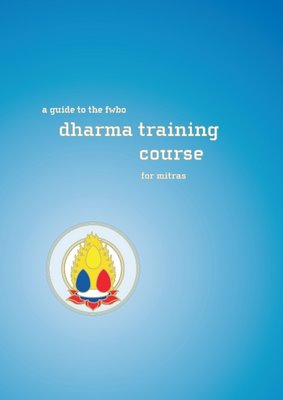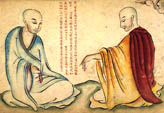A 'Map of Terms' for Triratna Dharma
 Mat New writes from Madhyamaloka, a Triratna community in Birmingham UK, asking us to publicise his ‘Map of Terms’ - a rich and accessible summary of the Dharma, as shown in the photo opposite. It's a simple one-sheet summary of all the main Dharma terminology used in Triratna, plus the relationships between them. He says - “I am distributing an A0 poster (120cm x 85cm) of some of the most popular Buddhist lists and terms presented in a logical, graphical format. Its main function is reference and recollection, and would be ideal for hanging on the wall in any area where study/reading/discussion takes place.
Mat New writes from Madhyamaloka, a Triratna community in Birmingham UK, asking us to publicise his ‘Map of Terms’ - a rich and accessible summary of the Dharma, as shown in the photo opposite. It's a simple one-sheet summary of all the main Dharma terminology used in Triratna, plus the relationships between them. He says - “I am distributing an A0 poster (120cm x 85cm) of some of the most popular Buddhist lists and terms presented in a logical, graphical format. Its main function is reference and recollection, and would be ideal for hanging on the wall in any area where study/reading/discussion takes place.“The poster includes some of Sangharakshita’s teachings and paraphrased definitions, plus accurate Pali and Sanskrit translations for all terms. It’s been in existence for about a year and a half in many different forms (this is version 2.13) and I've been regularly discussing its progress with anyone who would listen! The final copy has been looked over in depth by Padmakumara and Shantavira, plus Saraha, Vidyaruci and Cittapala and others - in fact everyone who has stayed in my room over the last 12 months has spent time looking at it and discussing it with me.
“The main content (about 70% of it) is derived from Triratna’s Garland Of Terms, complied many years ago by Cittapala and Ashvajit. Each individual list is surely correct, and if there’s anything controversial about the Map it’s where each list sits in relation to each other - for example do the Four Right Efforts go under Meditation or Ethics? People who read it continually come up with more and more possibilities of where things *could* go, and more things that could be fitted in but as far as I'm aware the layout is as reasonable and valid as any other.
“There is also a disclaimer on the key at the bottom: 'Lists have been placed in a logical order, but this resource is not intended to provide a definitive map of how the Buddha’s teachings relate to each other. It has been produced primarily as a means of memorising material and quickly referring to many terms and lists found in the Buddhist tradition.'
“I can supply them for around £22, or £27 posted to addresses in the UK. That’s quite a lot I know, but it’s expensive to get them printed in such small quantities. All profits will go to the Birmingham Buddhist Centre’s 'Sangha Building' project - the much needed repairing, renovating and improving of the Centre. If you would like one then please email me at matnoo at hotmail dot com and I’ll send payment instructions”.
Kindly eyes,
Mat.
The Map is also available on the Triratna News ‘Resources’ page as a multi-page PDF for home printing.
Labels: Dharma teaching, publications






















 rss
rss